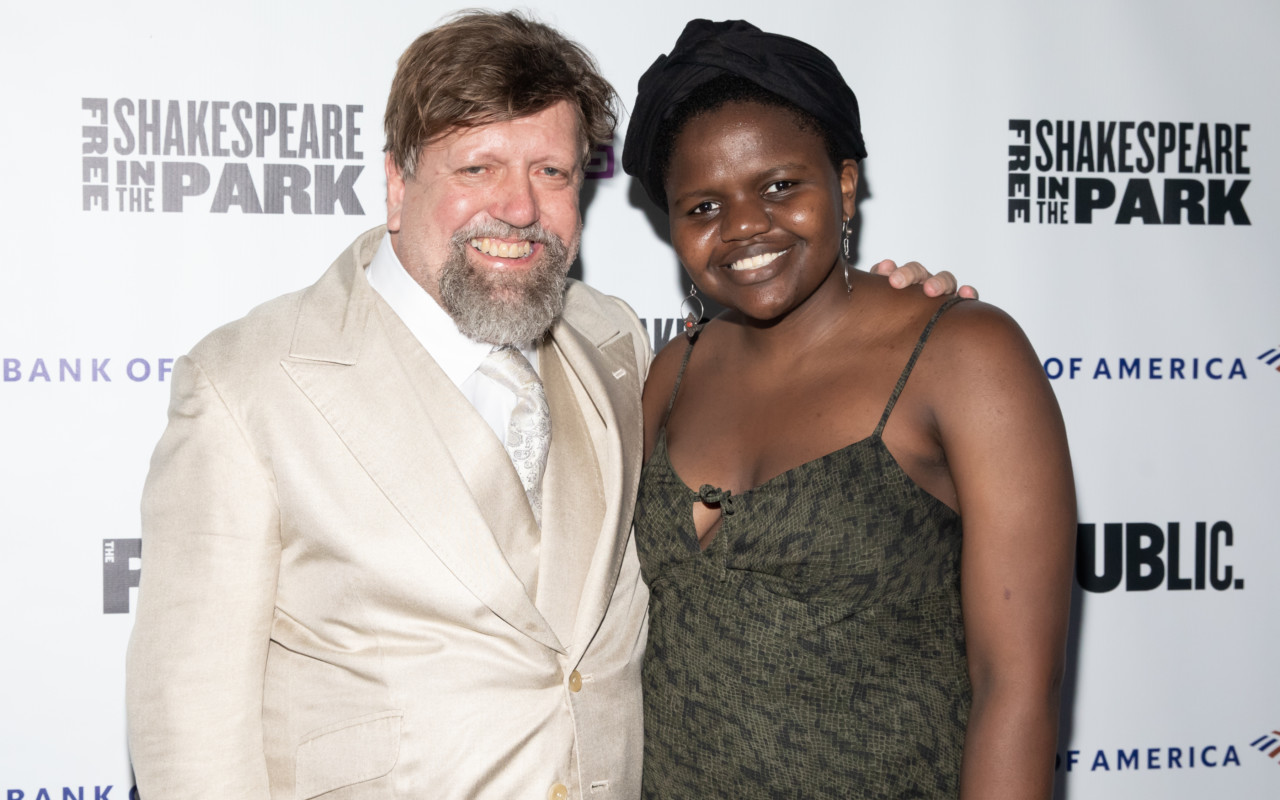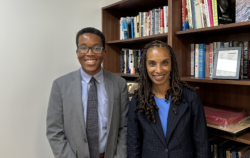
Ubben Posse Fellow Interviews: Oskar Eustis
The Jeff Ubben Posse Fellows Program awards five exceptional Posse Scholars $10,000 each and the chance to spend 4-6 weeks during the summer shadowing and learning from a major industry leader. The interview below with Oskar Eustis, artistic director of The Public Theater, was conducted by Posse Scholar Gloria Oladipo, now in her junior year at Cornell University, who worked with Oskar Eustis as a 2019 Jeff Ubben Posse Fellow. The conversation has been edited and condensed.
GLORIA: Tell me a little bit about your parents or the people who raised you. Life growing up in general.
OSKAR EUSTIS: I grew up in Rochester, Minnesota. My dad was a lawyer. More importantly, he was an alcoholic. By the time I was five, he was mostly institutionalized over the following five years and I was primarily raised by my mother, an extraordinary woman. She was brilliant. She had been getting her Ph.D. in English literature in 1955, or 1954, at the University of Chicago, but when my dad was drafted she dropped out of school and moved to Fort Smith, Arkansas, where he was stationed. For years, she would go to work, she would be gone in the morning when we would get up, she wouldn’t come home until 7 o’clock at night. Finally, in 1968, September 21st, my father sobered up and stayed sober for the last 20 years of his life. He came sort of roaring back into our lives. My parents each remarried other people and we moved to the Twin Cities, so essentially I had four parents that didn’t speak to each other. That’s probably more about my childhood than anybody wants to know.
I disagree, we’re going to backtrack and talk a little more about that. What did your parents think about the arts?
“I felt like I had something to prove.”
They thought the arts generally were wonderful, but they hated the idea of me going into the theater and part of it was the old-fashioned idea that they were really worried about the economic insecurity. Now, none of them had had much money. They also were disappointed because I had presented as academically precocious and I think the fact that I didn’t pursue an academic career was disappointing. And finally, the theater didn’t feel like a great art form to them. If I had become a novelist, they would have been scared for me economically but they thought that that was a more dignified career. I was putting on plays. But I will say, by the time they died, all of them were very supportive of what I do.
And how do you think they would describe you, both now and in childhood? In three words.
Smart, loud, emotional.
Okay. Let’s do a quick shift, more about you as a kid because you had a very interesting childhood experience. I’m just interested, as a kid, what were you like? Did you have any leadership roles?
No. I was smart. I never had a lot of friends. I thought of myself as a fat, asthmatic kid. And I don’t think I evidenced any leadership qualities until I left home. I think I was socially stunted, because of skipping grades. And because those were the days we were all hippies, I did a lot of drugs and I did a lot of bumming around. I would be petrified if a child of mine was doing what I was doing. I moved to New York when I just turned 16. I was crazy! For most of my life, I’ve described it as a pirate story but in recent years, I feel like I really had to face the fact that another way to tell this story is, “You want to know how powerful white, male privilege is? It’s so powerful I didn’t have to go to college and I ended up running this theater.” I didn’t recognize it at the time, but looking back it is absolutely a part of the story: being straight, and big, and white, and male, and hyperarticulate, I could get a lot that other people couldn’t get without being credentialed.
I feel like you’ve spoken a lot about that time period. What’s something people don’t really know about that time, whether it was insecurity, or not being happy? Because I hear about someone moving to New York City in the 70s or 80s and I think to myself…
What the #@$!?
Well, yeah.
In a way, you’ve put your finger on it. I was not motivated by desire. I was motivated by fear. I felt like I had something to prove. I felt desperate all the time. I felt like I needed to justify my existence and show people I was worthy. And I think I harnessed some of that to my advantage. The idea of, “I’m scared, I’m desperate, so I’m going to use some of that to work incredibly hard.”
You’ve talked a lot about being desperate. Where was that desperation coming from? What did failure mean to you in that time period? What if you had gone to New York and completely crashed?
Um, I don’t know exactly. It was psychological, it wasn’t practical. I felt incredibly lonely and incredibly unseen and I felt—and in some sense, I still do—like I had to earn the right for people to love me and care about me. I had to achieve. If I didn’t achieve something, there was no way anyone was going to like me and, I don’t know, maybe some of it was true [laughs]. But it drove me, and I know it has been something I’ve had to struggle with since, as a grown-up. Because it’s actually not a good way of moving through the world.
What are some ways you feel really good about moments in your career? And ways in which you don’t?
“Artists have to get people interested in what they have to say.”
I have been less successful than I would like with Native American work. I’ve spent a number of years doing convenings with Native American theater artists and plays—it’s a very important issue for me. But I made a big mistake and I put on a play, Bloody Bloody Andrew Jackson, and one character was a cartoon person who was indigenous and I didn’t think about the relationship between the two. When my Native American colleagues found out about it, they flipped out. I then went through months—I flew people in from all over the continent in order to hate the show I was producing because I wanted to talk about it. I have two principles here—I absolutely don’t believe in artistic censorship, and I absolutely do believe that you have to listen to people who have been dispossessed and affected. And those two principles clashed in this case. By the end of it, I had lost the trust of dozens and dozens of Native American theater artists who I’d been involved with. I’m trying to repair that, but it’s very slow going.
When you talk about empowering across demographics, and empowering young artists, I’m curious about this idea of who succeeds and who doesn’t. Why do some artists “make it” as determined by whatever criteria, and some artists don’t?
Artists have to get people interested in what they have to say. That’s true for a playwright, a director, an actor. I can define “people” here in many different ways. They can be mass audiences, they can be a small group of foundation executives, people in your community—but you can’t “make it” unless you convince other people that they want to sit down and listen to you.
How do you suggest people who have historically been ignored solve that question of making their work interesting? How can they feel more investible?
I don’t think you can quite go about it simply by making your work interesting, because almost everybody fails. For us as creators, the bet we’re making is that we can dig deep enough and tell the truth enough about ourselves that we won’t just be talking about ourselves. The other way I put it is that I’m making a bet every day that I’m not crazy. That if I like something and respond to something, other people will. Not everyone will—it doesn’t have to be everybody—but some people. If nobody responded to what I’m responding to, I’d be out of a job so fast [laughs]. Everybody who is unhappy in this work who hasn’t quit the theater is either unhappy because they’re too rigidly hanging onto their idea of what they want to do and they don’t want to listen to the world, or they’re too eager to give the world what it wants and they don’t know how. If you’re trying to figure out what the world wants and give it to them, then go to Hollywood, you’ll make much more money [laughs].
What have been moments in your career when you felt a spark in other people?
In me or in other people?
Both.
This sounds corny, but if I think about when I feel sparks in other people, it’s almost every day. It’s unbelievable how much talent and how much brilliance is out there, how extraordinarily special people are. The fact that I get to work with them is unbelievable. And the great joy is when you see it and go, “Oh.” With Kenny Leon, as we talked [about this summer’s Shakespeare In The Park production of “Much Ado About Nothing”] I just kept saying, “Kenny, I’m hiring you. I’m not hiring some Shakespeare guy. I want this to look like you and feel like you.” All I was doing was cheering for Kenny and saying, “Be yourself,” and boy, you know? Proof in the pudding! It’s a great, great production and I’m so proud of that, but none of that is me. It’s not my show. It’s me doing a good job creating the conditions for Kenny and others to create. And what a joy is that!
Read More:
Ubben Posse Fellow Interviews: David Ricks
Ubben Posse Fellow Interviews: Jenny Rickard
Ubben Posse Fellow Interviews: Tim Shriver
Meet the 2019 Jeff Ubben Posse Fellows.

